
Shimoga, officially known as Shivamogga, is a city and the district headquarters of Shimoga in the central part of the state of Karnataka, India. The city lies on the banks of the Tunga River. Being the gateway for the hilly region of the Western Ghats, the city is popularly nicknamed as "Gateway of Malnad".
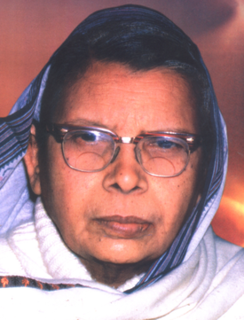
Mahadevi Verma was a Hindi poet, freedom fighter and educationist from India. She is widely regarded as the "modern Meera". She was a major poet of the "Chhayavaad", a literary movement of romanticism in modern Hindi poetry ranging from 1914–1938 and a prominent poet in Hindi Kavi sammelans.

Akka Mahadevi (c.1130–1160) was one of the early female poets of the Kannada literature and a prominent person in the Lingayat sect of Hinduism in the 12th century. Her 430 extant Vachana poems, and the two short writings called Mantrogopya and the Yogangatrividhi are considered her most notable contribution to Kannada literature. She composed fewer poems than other saints of the movement. The term Akka is an honorific given to her by great Lingayat saints such as Basavanna, Siddharama and Allamaprabhu and an indication of her high place in the spiritual discussions held at the "Anubhava Mantapa". She is seen as an inspirational woman in Kannada literature and in the history of Karnataka. She considered the god Shiva as her husband,.
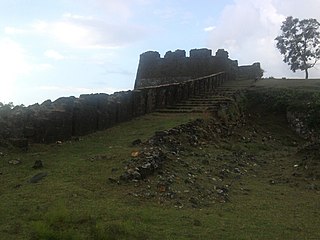
Nagara is a historic village in the Shimoga district of the state of Karnataka, India. It is 17 kilometres (11 mi) from Hosanagara or 84 kilometres (52 mi) from Shimoga. This was called "Bidanur (Bidanoor)" or "Bidnur (Bidanoor)" earlier during the 16th century, this was the last capital city of Keladi rulers.
Akka or AKKA may refer to:

Shimoga district, officially known as Shivamogga district, is a district in the Karnataka state of India. A major part of Shimoga district lies in the Malnad region or the Sahyadri. Shimoga city is its administrative centre. Jog Falls is a major tourist attraction. As of 2011 Shimoga district has a population of 1,752,753. There are seven taluks: Soraba, Sagara, Hosanagara, Shimoga, Shikaripura, Thirthahalli, and Bhadravathi.
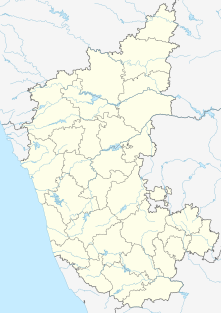
Shiralakoppa is a panchayat town in Shikaripur Taluk, Shimoga district in the Indian state of Karnataka.
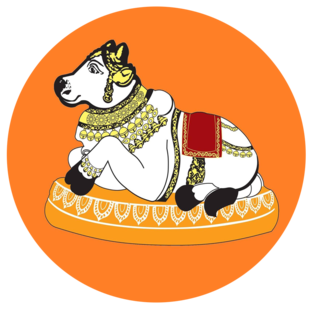
Allama Prabhu was a 12th-century mystic-saint and Vachana poet of the Kannada language, propagating the unitary consciousness of Self and Shiva. Allama Prabhu is one of the celebrated poets and the patron saint of the Lingayata movement that reshaped medieval Karnataka society and popular Kannada literature. He is included among the "Trinity of Lingayathism", along with Basavanna, the founder of the movement, and Akka Mahadevi, the most prominent woman poet.
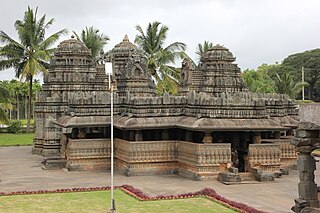
Balligavi a town in Shikaripura taluk Shivamogga district of Karnataka state, India, is today known as Belagami or Balagame. Its ancient names are 'Baligrama', Dakshina Kedara,Valliggame and Valligrame. Dakshina Kedara means Kedarnath of the South. A place of antiquity, it is known for its ancient monuments. Balligavi is located 72 km from Shivamogga city and 21 km from Shikaripura town and 2.3 km from Shiralakoppa in Shikaripura taluk. Balli in Kannada means creeper or vine.
Channabasavanna also known as " Guru Channabasaveshwara " was Basava's nephew and one of the foremost Sharanas of the 12th century. He, along with Basava, Allama Prabhu and Akka Mahadevi, played a pivotal role in the propagation of the Lingayat faith. He was the youngest among the sharana leaders and grew up in the household of Basavanna as he was the son of Nagalambike, Basava's own sister. He also wrote the Karana Hasuge which is one of the most sacred texts of the Lingayats, among many vachanas. He propounded the "shatasthala" philosophy associated with the six holy places of Veerashaiva Lingayat creed. He succeeded to the Shunya Simhasana at Anubhava Mantapa, Kalyana after the departure of Allama Prabhu, circa 1162ad. His young shoulders carried on the legacy of Basava after the latter's departure to Kudalasangama in 1162ad. He is credited to have systematised the entire manual of simple rituals for the followers. He was a strong advocate of the Ishtalinga wearing and expounded the material as well as the esoteric meaning of that divine symbol. He held together the nascent group of Shivasharanas and Jangmas in tumultuous times of clashes with the orthodox Brahmins and heretic Jains. Following the assassination of Kalachuri King Bijjala II in 1167 A.D, Channabasava along with his followers migrated to Ulavi safeguarding the Vachana literature. He attained Samadhi state there at the age of 25 passing on the leadership of the movement to Siddarama.
Anubhava Mantapa, established by Basava in the 12th Century C.E. is located in Basavakalyan in Bidar district of Karnataka. It is the first religious parliament in the world whose literal meaning is "experience pavilion". and was an academy of mystics, saints and philosophers of the lingayat faith in the 12th century. It was the fountainhead of all religious and philosophical thought pertaining to the lingayat. It was presided over by the mystic Allama Prabhu and numerous Sharanas from all over Karnataka and other parts of India were participants. This institution was also the fountainhead of the Vachana literature which was used as the vector to propagate Veerashaiva religious and philosophical thought. Other giants of veerashaiva theosophy like Akka Mahadevi, Channabasavanna and Basavanna himself were participants in the Anubhava Mantapa. The Anubhava Mantapa also called as the Mahaamane.
Chamarasa was an eminent 15th century Virashaiva poet in the Kannada language, during the reign of Vijayanagar Empire, a powerful empire in Southern India during 14th - 16th centuries. A contemporary and competitor to a noted Brahmin Kannada poet Kumara Vyasa, Chamarasa was patronised by King Deva Raya II. The work is in 25 chapters (gatis) comprising 1111 six-line verses (shatpadi).
Dr Poojya Maate Mahadevi M A B. Sc(13 March 1946 – 14 March 2019) was an Indian Spiritual leader, scholar, mystic, writer and first female Jagadguru, spiritual head of the Indian Lingayat community.
Nationality words link to articles with information on the nation's poetry or literature.
Nationality words link to articles with information on the nation's poetry or literature.
The term Shiva Sharanas/Sarana can be roughly explained as devotees of Lord Shiva. The 12th century Vachanakaras are also known by this name. Sharana is somebody who has surrendered oneself to the will of the Lord. Sharanu is derived from this term and it denotes the action of surrendering to or an act of respecting others. This term is seen in many Vachanas composed by the Vachanakaras namely Basavanna, Allama Prabhu, Akka Mahadevi and Madivala Machideva. The Vachanakaras, surrendering themselves to the will of Lord Shiva, have glorified and praised the forms of Lord Shiva. Not only this, the term signifies profound philosophical meanings. A sharana is given a prime place in the schematic world of Vachanas. An example for elevated position of a sharana is the following vachana of Basavanna.

Kitturu Chennamma is a 1961 Indian historical drama film in Kannada language, directed and produced by B. R. Panthulu. It stars B. Saroja Devi as Kittur Chennamma, an Indian freedom fighter who led an armed rebellion against the British East India Company in 1824, and died in captivity in 1829.
Allama is a 2017 Indian Kannada musical drama Historical film directed by T. S. Nagabharana. The film stars Dhananjay and Meghana Raj in the lead roles. Principal photography of the film started in late 2015. It was released theatrically on 26 January 2017.








